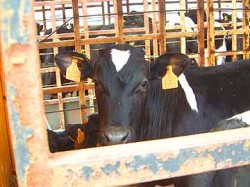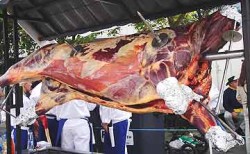
Last month in the New York Times, Michael Pollan wrote an open letter to the president-elect about the importance of revising our entire food policy. It’s a long letter, but I highly recommend it.
You can read his letter in The New York Times or on Michael Pollan’s website.
You can listen to Terri Gross interview Pollan about his letter on her NPR show, Fresh Air. It’s 40 minutes long.
Or you can download an MP3 of my computer reading Pollan’s letter. It’s 52 minutes of robot speech; a bit unpleasant at first, then no more irritating than reading text in a bad font. Not nearly as bad as reading reverse text (white text on a dark background). Listen carefully and you can even hear the robot take a breath at the beginning of sentences.
I’m trying to make it easy for you to ingest Pollan’s article.
After cars, the food system uses more fossil fuel than any other sector of the economy … chemical fertilizers (made from natural gas), pesticides (made from petroleum), farm machinery, modern food processing and packaging and transportation … [W]hen we eat from the industrial-food system, we are eating oil and spewing greenhouse gases. This state of affairs appears all the more absurd when you recall that every calorie we eat is ultimately the product of photosynthesis — a process based on making food energy from sunshine. There is hope and possibility in that simple fact.

Besides reverting to old-fashioned, clean, solar-powered farms, Pollan wants to see healthful food made affordable, nutrient-free junk food such as soda lose its “food” status, diversity in agriculture, crop rotation, feedlots opened up to the pastures, and much more.
Pollan’s core message is this: “we need to wean the American food system off its heavy 20th-century diet of fossil fuel and put it back on a diet of contemporary sunshine.” He acknowledges that this is a complex and gargantuan task. He has explanations and ideas for every aspect of feeding America, starting with the Farm Bill and ending with family dinners. It’s hopeful, and hopefully practicable.
Pollan questions some of the wacky food things we do now, such as shipping American raised salmon and chicken to China for cutting up, then shipping the raw stuff back to the U.S. to sell. And he’s got a few wonderfully wacky ideas of his own. For example, he’d like to see the White House front lawn replaced by a produce garden, the excess of which should go to a local food bank. And perhaps forgive culinary-school student loans if graduates cook and teach in public schools for a spell. And committing the White House to one meatless day a week which, he says, if all Americans did would equal taking 20 million midsize cars off the road for a year.

In his Fresh Air interview, Terri Gross asks Mr. Pollan if he heard from a representative of either candidate after the publication of his article. No, he answered, except that one of the campaigns’ transition teams (unnamed) asked if Mr. Pollan could provide a one- or two-page summary for them. He refused, saying “the reason I wrote 8,000 words is because that’s what I needed to tell the story. If I could have written it in one or two pages, I would have.”
Barack Obama refers to Pollan’s article in an October 18, 2008 interview for Time magazine and appears to take the issues to heart. Good sign. We’ll see.
Michael Pollan has been one of my favorite food writers since I read his article Power Steer in 2002. Now I urge you to read Farmer in Chief.






1 Comment
I heard about the request for a one or two page summary. Kind of discouraging, isn’t it!